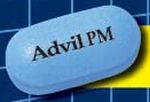Advil PM and Alcohol/Food Interactions
There are 3 alcohol/food/lifestyle interactions with Advil PM (diphenhydramine / ibuprofen).
Ibuprofen Alcohol (Ethanol)
Moderate Drug Interaction
Ask your doctor before using ibuprofen together with ethanol (alcohol). Do not drink alcohol while taking ibuprofen. Alcohol can increase your risk of stomach bleeding caused by ibuprofen. Call your doctor at once if you have symptoms of bleeding in your stomach or intestines. This includes black, bloody, or tarry stools, or coughing up blood or vomit that looks like coffee grounds. It is important to tell your doctor about all other medications you use, including vitamins and herbs. Do not stop using any medications without first talking to your doctor.
Diphenhydramine Alcohol (Ethanol)
Moderate Drug Interaction
Ask your doctor before using diphenhydrAMINE together with ethanol (alcohol). Use alcohol cautiously. Alcohol may increase drowsiness and dizziness while you are taking diphenhydrAMINE. You should be warned not to exceed recommended dosages and to avoid activities requiring mental alertness. If your doctor prescribes these medications together, you may need a dose adjustment to safely take this combination. It is important to tell your doctor about all other medications you use, including vitamins and herbs. Do not stop using any medications without first talking to your doctor.
Switch to professional interaction data
Ibuprofen High Blood Pressure (Hypertension)
Major Potential Hazard, Moderate plausibility
NSAIDs - fluid retention
Fluid retention and edema have been reported in association with the use of nonsteroidal anti-inflammatory drugs (NSAIDs), including some topical formulations. NSAIDs (including topicals) can lead to new onset of hypertension or worsening of preexisting hypertension, either of which can contribute to the increased incidence of cardiovascular events. NSAIDs should be used with caution in patients with preexisting fluid retention, hypertension, or history of heart failure. NSAIDs should be avoided in patients with severe heart failure unless the benefits are expected to outweigh the risk of worsening heart failure; if an NSAID is used in such patients, they should be monitored for signs of worsening heart failure. Blood pressure and cardiovascular status should be monitored closely during the initiation of NSAID treatment and throughout the course of therapy.
Switch to professional interaction data
Advil PM drug interactions
There are 756 drug interactions with Advil PM (diphenhydramine / ibuprofen).
Advil PM disease interactions
There are 19 disease interactions with Advil PM (diphenhydramine / ibuprofen) which include:
- depression
- asthma
- fluid retention
- GI toxicity
- rash
- renal toxicities
- thrombosis
- anticholinergic effects
- asthma/COPD
- cardiovascular
- renal/liver disease
- glaucoma
- liver disease
- resp depression
- PKU
- anemia
- hepatotoxicity
- hyperkalemia
- platelet aggregation inhibition
More about Advil PM (diphenhydramine / ibuprofen)
- Advil PM consumer information
- Check interactions
- Compare alternatives
- Pricing & coupons
- Reviews (20)
- Drug images
- Side effects
- Dosage information
- During pregnancy
- Drug class: analgesic combinations
Related treatment guides
Drug Interaction Classification
| Highly clinically significant. Avoid combinations; the risk of the interaction outweighs the benefit. | |
| Moderately clinically significant. Usually avoid combinations; use it only under special circumstances. | |
| Minimally clinically significant. Minimize risk; assess risk and consider an alternative drug, take steps to circumvent the interaction risk and/or institute a monitoring plan. | |
| No interaction information available. |
Further information
Always consult your healthcare provider to ensure the information displayed on this page applies to your personal circumstances.


